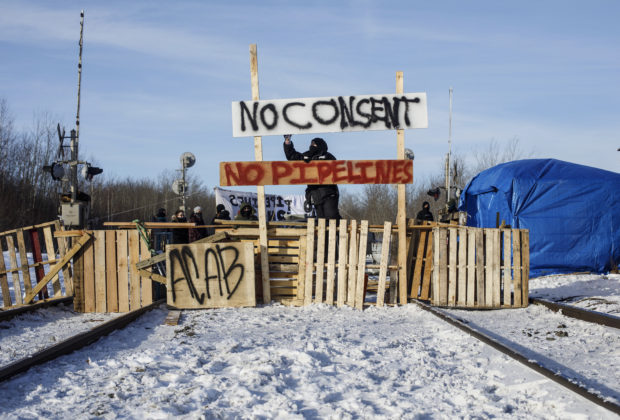Canada warns indigenous rail blockades could cripple economy
MONTREAL, Canada – The Canadian government warned Sunday that indigenous protests that have blocked rail lines for more than two weeks could cripple the economy, and urged a swift resumption of dialogue to end the crisis.

Supporters of the Wet’suwet’en who are against the LNG pipeline, block a Canadian National Railway line just west of Edmonton, Alberta, on Wednesday, Feb. 19, 2020. (Jason Franson/The Canadian Press via AP)
The main blockades — which were set up around the country 18 days ago to protest a natural gas pipeline being built across indigenous lands in British Columbia — were still in place Sunday, two days after Prime Minister Justin Trudeau called for their immediate lift.
What had started as a localized protest by members of the Wet’suwet’en tribe opposed to the pipeline quickly spread across the country as others joined efforts to “shut down Canada.”
On Saturday, leaders of that tribe reiterated their conditions for restarting talks: complete withdrawal of federal police from their ancestral lands and suspension of work on the pipeline by the company Coastal GasLink.
“We are working at the federal level to try to resume dialogue, for hereditary leaders to accept the fact that we agree to their demand for the withdrawal of the GRC from their territory,” Transport Minister Marc Garneau told Radio-Canada, referring to the Royal Canadian Mounted Police.
He said tribal leaders “should immediately put out the message that while this dialogue is under way, the barricades should be lifted.”
Article continues after this advertisement“This could go on for a long time” because it has a huge impact on the Canadian economy, Garneau said. “It could even affect our GDP if it continues.”
Article continues after this advertisementThe rail blockades, especially on an important east-west line, have forced the Canadian National Railway to suspend much of its freight traffic and lay off 1,000 people temporarily.
This is a delicate issue for Trudeau, who has made reconciliation with Canada’s indigenous peoples a top priority of his second term in office.